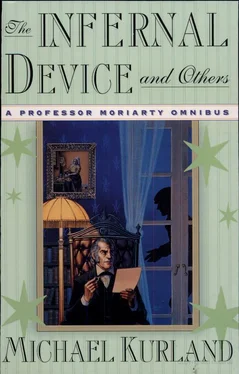"Damned fine history," Moriarty said, when Barnett insisted upon reading him the plaque, "damned uncomfortable furniture."
"Which is probably why the admiral left it behind," Barnett said, going over to the window and staring down at the street below. "What time is it, Professor?"
"Ten past seven," Moriarty said, snapping open his pocket watch, consulting it, and then snapping it shut again. "Have you an engagement?"
"No," Barnett said. "However, the thought of food has crossed my mind. I was just wondering why there are so many people on the street at this hour. But now that I take a good look at those passing below, it seems to me that about one out of four is a policeman."
Moriarty came over, polished his pince-nez, and glanced out the window. "I believe you're right," he said. "There's no mistaking the peculiarly heavy regulation shoe leather, and the special flatness to which a plainclothes policeman chooses to adjust his bowler."
"You don't suppose that our presence here has anything to do with their presence here, do you?" Barnett asked. "I should have thought that Lord East would regard the various military units as sufficient guard for his treasure."
"I'm sure he does," Moriarty said. "The police are here to protect tomorrow's crowds of onlookers from having their pockets picked. Every gang of dips in England is probably here tonight."
"Ah," Barnett said, continuing to stare thoughtfully out the window. "So you don't think the presence of these flatfooted gentlemen with the bowler hats will interfere with your plans?"
"No," Moriarty said. "Is this a subtle interrogation? You realize that there are some things that it would not do to print, even in an American newspaper."
"No, no," Barnett said hastily. "I was just wondering."
"Nothing could interfere with my plans now," Moriarty told him, "except a major flood. Which I do not anticipate. Shall we dine here at the hotel, or have you a better suggestion? Perhaps some establishment where your compatriots of the press will gather."
"Well," Barnett considered. "The Railway Arms commercial hotel is probably where most of the London reporters will be staying. But I doubt if the restaurant is very good; reporters' expense accounts are not up to first-class bills of fare."
"Nevertheless," Moriarty said, "it might behoove us to dine in that establishment, if they serve so late."
"I believe the dining room is open quite late," Barnett said. "They cater to the traveler."
"Well then, let us travel!"
The Railway Arms served a buffet dinner until ten, and was, as Barnett had anticipated, full of reporters come to witness the next morning's activities. Much to Barnett's surprise, the usually antisocial Professor Moriarty was quite pleased to meet Barnett's associates and seemed fascinated by the stories they had to tell. Barnett's surprise lessened when he realized that the professor was artfully turning each of the stories to extract the last bit of information about Lord East, the treasure, and the train ride. Which, since that is why they were all there — in one way or another — was not hard to do.
"I say, Barnett," said Harry Inglestone, a Morning Chronicle staff reporter who had just come straight down from London, pausing at their table, "Caterby-Cahors is rather perturbed at your young lady."
Barnett stifled the remarks that sprang to his lips at milestone's innocent use of the phrase "your young lady." A forced smile creased his face. "What is your editor concerned about?" he asked. "If you are referring to Miss Perrine, formerly of the American News Service staff, she is one of the most competent reporters I have ever known, aside from possessing sufficient organizational skills to run an office single-handedly."
"Which is what makes it so puzzling," Inglestone commented, sitting himself down at their table and happily accepting Moriarty's offer of a glass of something. "A nice after-dinner claret," he told the waiter.
"What?" Barnett asked.
"I beg your pardon?" Inglestone said, looking totally confused. "What is so puzzling?"
Inglestone thought over the recent conversation, trying to pick up the missing thread. "Oh, yes; Miss Perrine's disappearance. Thought I mentioned it, old man."
"What do you mean, her 'disappearance'?" Barnett demanded. "When did she disappear? What are you talking about?"
"Sorry again, old man. I should have realized that you'd be concerned. Ex-employer, and all that. Should have occurred to me that you didn't know. Well, I tell you, just between us, if she doesn't turn up quickly, she's going to lose her job, Lady Hogbine or no Lady Hogbine. Ah! The claret; thank you, Binns. It is Binns, isn't it? I shall mention you in the dispatches. Binns of the Railway Arms. A life-saver."
"Disappearance," Barnett prompted.
"Oh, yes. Well, it's this way, old man. The lady went out on an assignment last night. No, it would be night before last, now. Doyle went with her. Artist fellow. Fine work. Well, Doyle left to take the carriage back to the Warren." He turned to Professor Moriarty. "That's what we call the lovely common room maintained for the reporters, 'the Warren.' "
"How clever of you," Moriarty murmured politely.
"Yes, well, Miss Perrine never showed up at the carriage. Doyle finally decided that she was chasing up some information or other, and returned to the Warren by himself. And, well, to make a long story short, she never did come back."
"Never got back? To the office, you mean?"
"Yes. Caterby-Cahors sent someone around to her house, and her pater was quite concerned at her absence. Claimed that she hadn't been there, either. And it certainly wasn't her custom to stay out all night. But if a lady is going to choose to be a reporter — well, you know, exigencies of the job, and all that. At any rate, Caterby-
Cahors was furious. He can't even stand tardiness, so you can imagine how he feels about unexcused absence. He was ready to fire her outright until the note came."
"The note?"
"Miss Perrine was considerate enough to send a note. She said she was after a very hot lead, and not to wait the story for her, but to write it as it stood. She might be a few days, she said. Well, Caterby-Cahors was fit to be tied. Had to get the information on the murder she was covering from Doyle. Nice fellow, Doyle; good sketch artist, but no reporter. Caterby-Cahors has given Miss Perrine three days to turn up with story in hand, and it had better be a dilly. That was Caterby-Cahors's term, 'a dilly.' "
Barnett turned to Moriarty. "Something's happened to her," he said.
Moriarty considered. "I believe you are right," he said. "She has been covering that series of murders?"
"Yes." Barnett felt the blood drain from his face. "My God! You don't think—"
Moriarty put out a restraining hand. "No, I don't," he said. "Stay calm."
Inglestone looked from one to the other of them. "I say!" he said. "You don't suppose something has happened to Miss Perrine?"
"Something has definitely happened to Miss Perrine," Moriarty said. "Even my rather sketchy acquaintance with her over the past two years tells me that she didn't run off. And she certainly isn't skulking about on some London street, following a suspect. If she were, she would have found a better way to communicate than a brief note. And she certainly would have informed her father."
"But—"
"On the other hand, Mr. Barnett, the pattern of this murderer we're dealing with shows that he doesn't attack women; that he doesn't make the sort of mistake that would have enabled Miss Perrine to walk in on him; and that he doesn't conceal bodies. So, as no body has been found, we must conclude that whatever happened to Miss Perrine, it was not the doing of our multiple killer."
"That's very reassuring," Barnett said. "She may be lying bleeding on some street, sliced up by some maniac, but at least it's a different maniac! I've got to get back to London!"
Читать дальше












